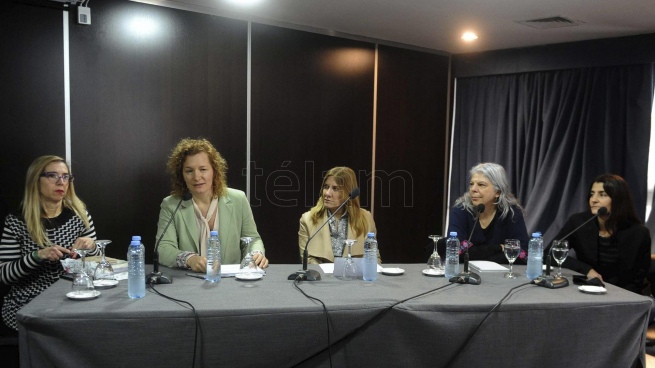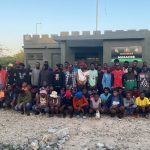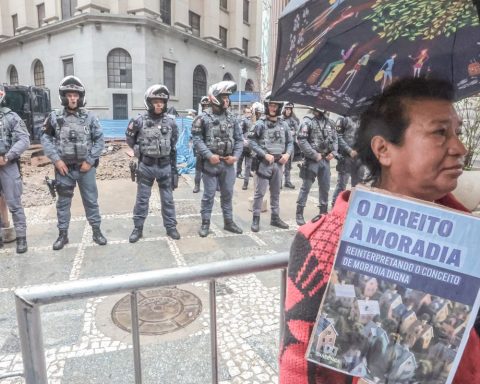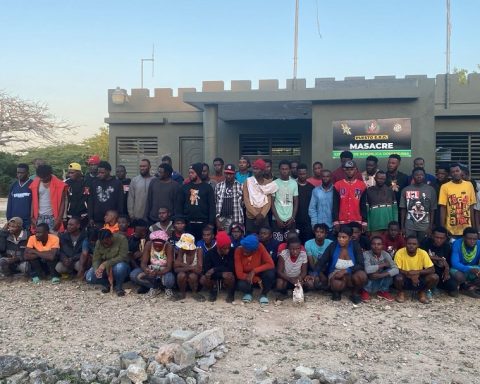A project to declare of legislative interest to the Network of Gender Editors (REG)created last year by the United Nations Population Fund in Argentina (Unfpa)was presented this week at the Legislature of Buenos Airese, within the framework of a conference on journalism with a gender perspective.
The president of the Gender Commission of the Chamber of Deputies Alexandra Lorden; along with the vice president, Ayelen Rasquetti; and the director of Gender Equity of the body, Mariela Breadled the presentation of the initiative and opened the day in which journalism with a gender perspective was discussed.

“We are facing a society that must be deconstructed, even if it is a work of years, because we are dealing with many cultural issues that have filled us with vices,” said Lorden, highlighting the importance of the role of feminist journalists.
Rasquetti indicated that in a scenario where “history is always told by men”stated that “the genre editors add a look and a different perspective to everything that today generates opinion in society”.
Bread highlighted that the conference was an example of “the strategies that we women develop to guarantee our rights”. In addition, he pointed out that the role of gender editors “exalts our country, which is at the forefront with legislation on the matter.”
✊? Gender editors play a key role in achieving journalistic content with a gender perspective.
▶️ In this video, their colleagues tell us why it is important to have them in the media where they work ? pic.twitter.com/ShkItcKzty
— RedDeEditorasDeGenero (@GeneroRed) June 8, 2022
Journalists and gender editors participated in the activity Silvina Molinafrom Telam; Mariana Iglesiasfrom Clarin; ingrid beck, Letter P; Y Mariana Isasi, head of the Argentine office of UNFPA; who spoke about their role in the different media and their role in cultural transformation.
Journalism and the gender perspective
The Network of Genre Publishers was founded on November 25, the International Day for the Elimination of Violence against Women, as an initiative of the United Nations Population Fund and is unique in the world.

“There is an essential value in the promotion of human rights, in the gender perspective that they play within the media and abroad,” said the head of UNFPA and stressed that “if this network has been of any use, it is in order to consolidate the role of gender editors”.
“Know that there is an international gaze observing what is happening in Argentina, beacon in feminist struggles“, he pointed.
For its part, Silvina Molinahighlighted the importance of having “the support and institutional visibility” granted by UNFPA and highlighted the emergence of the network because, he said, otherwise the work “is lonely, difficult and poorly understood.”

The journalist reviewed the emergence of the role in 2017 at the initiative of the New York Times and, after mentioning the cases of Spain, Brazil and Peru, assured that most of the genre editors are in Argentina.
“This has to do with our history,” she said after mentioning the different initiatives of the feminist movement and added: “We come from collective constructions and journalists have always been there”.
“We do journalism. We have come to contribute to the dialogue that we need so much. We work in different media that have their own interests, but we take care of each other, we respect each other, we accompany each otherMolina valued.

the journalist ingrid beck maintained that “gender spaces do not seek to impose anything on anyone”, but instead “advocates journalism with a gender perspective, which is journalism with human rights perspective and it has to do with improving the quality of journalism and finally improving the quality of democracy, raising the standards of freedom of expression.”
Beck indicated that currently only “14% of hierarchical positions in the media are held by women” and stated that the work of gender editors “is more difficult because there are no large alliances in decision-making spaces to distribute the idea of a gender perspective and spread the quality journalism that we want to do.”

While, Mariana Iglesiasconsidered that “despite the advances we continue with all kinds of inequalities that affect our entire lives” and in that line he asked: “Why, if we are half of the world, are we not half in the newsrooms?”.
Iglesias, in addition, although he stressed the need to continue referring to the way in which the media should deal with femicides, considered that it should not stop making visible that it is “the ultimate consequence of inequality, the absolute basis of violence and that It starts in each of our homes.”
In addition to the journalists who participated in the panel, the Network of Gender Editors (REG) is made up of Marina Abiuso (TN/Artear), Carmen Amador (El Tribuno de Jujuy), Lorena Leeming (Diario Jornada and Cadena Tiempo de Chubut); Laura Loncopán Berti (Diario Río Negro), Julia López (Media System of the National University of Cuyo), Gabriela Pellegrini (Chaco TV, Radio Provincia and Agencia FOCO), Clarise Sánchez Soloaga (República de Corrientes) and Gabriela Weller (Multimedios de Radio and Television of the National University of Córdoba).


















